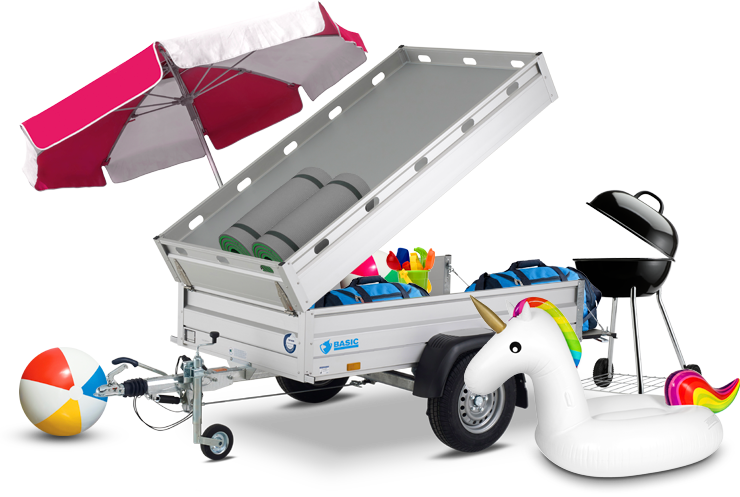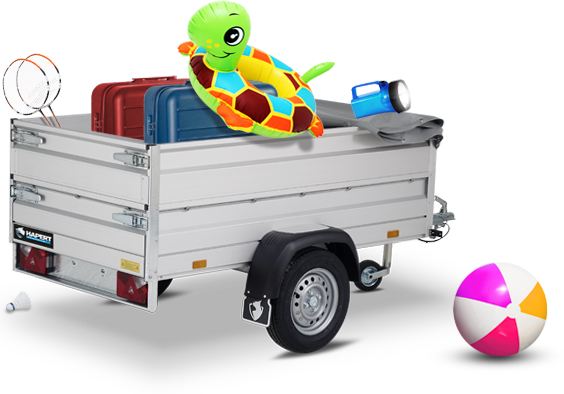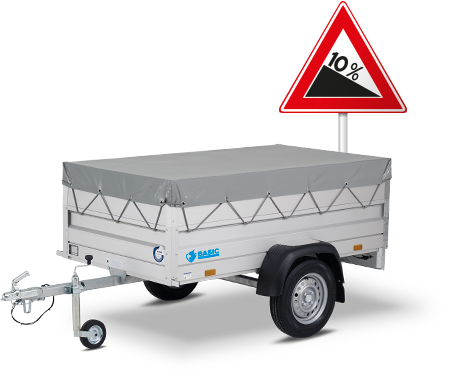DRIVING SAFELY WHILE TOWING A LUGGAGE TRAILER
Are you going on holiday soon with your car and luggage trailer? Go through the checklist below and avoid dangerous situations on the road. Have a safe journey!
Checklist:

AVOID OVERLOADING
When loaded properly luggage trailers remain stable on the road. Make sure your trailer is not too heavily loaded. This will not only help you to avoid dangerous situations on the road, but also hefty fines. In the Netherlands, fines for driving when towing an overloaded trailer range from € 90 to € 300. The more heavily overloaded the trailer is, the higher the fine.
If you are not absolutely sure what the maximum gross loading capacity of your luggage trailer is, you can easily look it up on our website, or contact your HAPERT dealer to find out.
FIND OUT YOUR TRAILER'S LOADING CAPACITY HERESecure the luggage properly
Make sure the luggage is properly secured so it cannot shift or slide around while you are driving. Loose luggage can negatively impact on your trailer's road-holding.
Distribute the luggage evenly
Follow the tips below to distribute the luggage evenly to guarantee that the brakes work properly and the trailer's road-holding is optimal.
- Make sure the centre of gravity of the luggage lies as close as possible above the axle.
- Stow all heavy luggage as much as possible above the trailer's axle.
- Distribute the luggage evenly over the left and right half of the trailer.
- Avoid point loading.
- Hitch the trailer to your car before you start loading your luggage.
Make sure the ball thrust is correct
Always avoid a ball thrust that is too low or too high. If the ball thrust is incorrect, your trailer could start to sway. The ideal ball thrust is close the maximum value permitted for the tow bar. The maximum ball thrust is usually listed on the type plate of the tow bar or vehicle.
Would you like to know more about how to get the correct ball thrust?
READ EVERYTHING YOU NEED TO KNOW ABOUT BALL THRUST HERE
CHECKING TYRE
PRESSURE
Avoid overloading
The way in which your trailer is loaded and the tyre pressure have a significant impact on safety. This is why you should always check the tyre pressure before you set out. The correct tyre pressure not only gives better grip on the road, but also minimises the risk of a blow-out. The tyres also last longer.
Also make sure the rear tyres of your car are filled to the maximum recommended pressure. This is necessary to enable the car to pull the trailer while carrying the weight of the luggage in the boot.
THE CORRECT TYRE PRESSURE IN FIVE STEPSADJUSTING THE HEADLIGHTS
A fully loaded trailer and the weight of extra luggage in boot can cause the car's headlights to point upwards. In this case, it is important to adjust the headlights so they point horizontally before you go on holiday with a loaded trailer.
HITCHING THE TRAILER
Check whether the trailer coupling drops correctly into place. The weight pushing down on the tow bar locks the coupling in position. You can always hear when this happens. If the trailer is hitched correctly, the tow bar ball will no longer be visible and the handle should automatically slide back to the starting position (marked with a green '+' sign).
Handbrake safety cable
Check whether the handbrake safety cable is tightly secured. The cable will activate the handbrake on the trailer if it should accidentally unhitch. If this happens, the pulling force of the car will break the cable and the trailer will automatically brake. In accordance with regulations, the handbrake safety cable must be attached to a fixed point on the car or tow bar. Attention: Looping the handbrake safety cable around the tow bar is not allowed in the Netherlands.
If your tow bar does not have a fixed attachment point, use an auxiliary coupling.
Plug and socket
Check whether the plug is pushed correctly into the socket.
Trailer handbrake
Make sure the trailer's handbrake is off before you start driving.
The trailer's lightning
Check whether the trailer's lights work. Trailers must be fitted with:
- 2 side lights (white) if wider than 1.60 metres
- 2 rear indicator lights (red or amber)
- 2 brake lights (red or amber)
- 2 rear lights (red)
- 1 number plate light (white)
Because the trailer's lights might stop working for some reason or another while you are driving on holiday, it is advisable to take a wiring diagram of the plug with you.
Maximum speed
Every country has its own speed limits for cars towing trailers. Are you going on holiday abroad? We have made a table of the maximum speeds that apply in the most popular holiday countries.
CHECK THE MAXIMUM SPEED IN YOUR HOLIDAY COUNTRYWhile driving to your holiday destination, the trailer might start to sway. You should always know what to do in this type of situation. If your trailer starts to sway, do the following:
- do not increase your speed;
- take your foot off the accelerator pedal and push down hard on the brake pedal;
- steer straight until the trailer stops swaying;
- slow down and continue driving until you reach the first place you can park.
After parking safely, check the following points on the trailer:
- Is the luggage evenly loaded?
- Is the luggage properly secured?
- Is the tyre pressure?
- Is the ball thrust optimal?
After making sure everything is in order, you can slowly continue your journey.
When driving downhill, it is important not to allow your car's speed to increase too quickly. Doing this helps prevent the trailer from starting to sway around.

Trova un facornitore vicino a te::

